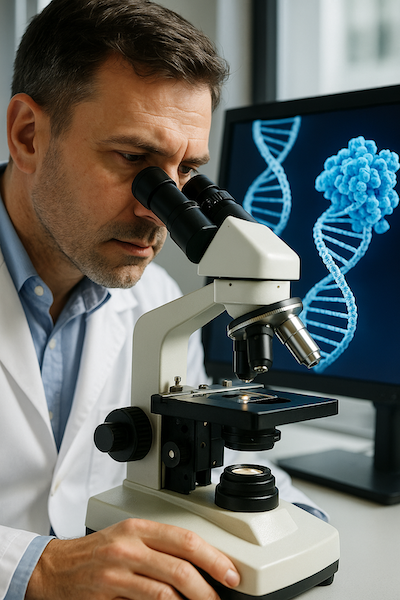The Protein that De-bunked “The Great Cholesterol Myth”

You’d have to be living under a rock to not know that the topics of cholesterol and cholesterol medications are controversial. I probably spend HALF of EVERY day talking with people who have very strong opinions on the subject, even if they aren’t personally familiar with any research.
There are countless “influencers” out there who have created huge commercial businesses out of challenging one of the foundational concepts of modern cardiology and preventive medicine.
These “experts” have made names for themselves by highlighting their anti-establishment viewpoints in books, blogs and podcasts and cherry-picking factoids to support their claims.
But they sure are compelling, aren’t they? They direct readers and listeners to focus on factors such as chronic low‐grade inflammation, oxidative stress, sugars, and metabolic issues (e.g., insulin resistance, abdominal fat), saying they are far more central in causing heart disease than merely high cholesterol. They frequently point out the very true fact that more than half of people hospitalized for heart attacks have “normal” cholesterol levels, ignoring that there are many risk factors for heart attack, like smoking or diabetes, and these patients can easily have apparently normal cholesterol levels.
These influencers emphasize the role of small dense LDL particles, triglyceride/HDL ratios, homocysteine, fibrinogen, etc. as better markers of risk. They highlight that cholesterol has many physiological roles: hormone production, cell membranes, etc—and say that demonizing it may not just be misguided but actually harmful. They ask: “Why would you lower cholesterol when the brain needs cholesterol?” Regarding medications, they claim that statins are harmful and if there is any benefit, it is largely due to their anti‐inflammatory effects rather than purely the cholesterol‐lowering.
So what is the truth? Can it really be determined? Is cholesterol really integral to the development of heart disease? Is lowering cholesterol really effective? Is it safe?
While the medical profession has been comfortable for decades with the knowledge that lowering cholesterol really is truly beneficial and important, Nature again gave us definitive proof over twenty years ago that makes this point inarguable.
But what is this proof that nature has provided? It’s the simple, beautiful story of a protein.
In 2003, researchers were studying families with a genetic abnormality that gave them extremely high cholesterol levels. Members of these families had “autosomal dominant familial hypercholesterolemia.” But what made these families different is that some of these patients had no mutations in the “usual suspects” known for decades to cause high cholesterol. Usually, genetically high cholesterol is caused by a mutation in the gene that creates the “LDL Receptor”, a protein that sits on the liver and yanks cholesterol out of the blood stream. Have a mutation in this gene, and you create an abnormal protein that doesn’t work right, and can’t pull cholesterol out of the blood. As a result, higher blood cholesterol levels.
Instead, these families had mutations in a different gene—eventually named PCSK9 (short for proprotein convertase subtilisin/kexin type 9) — that made the protein hyperactive and caused very high LDL levels and premature heart disease.
Shortly after its discovery, population studies found people with the exact opposite problem: different mutations in PCSK9 that made the protein inactive. And these people had very low LDL cholesterol and dramatically lower rates of coronary heart disease, without obvious downsides.
In other words, too much PCSK9 → high LDL and more heart disease, while too little PCSK9 → low LDL and protection.
This pattern—lower LDL starting from birth → large reduction in coronary heart disease and cardiovascular mortality over a lifetime—is exactly what you’d expect if LDL is not just associated with atherosclerosis, but a direct cause of it.
In other words, PCSK9 became one of the best real-world, human examples that lower LDL from early in life = lower plaque burden = fewer heart attacks and strokes.
And here finally is the indisputable proof we’ve been waiting for. For many years, there were skeptics who argued that cholesterol was just an innocent bystander in plaques, not a true cause of heart disease. But the PCSK9 protein only affects LDL. It doesn’t alter inflammation, oxidative stress, or metabolic issues. That’s a powerful validation of the cholesterol hypothesis. And a total repudiation of anyone who tries to claim that cholesterol levels aren’t important.
Nature (via genetic abnormalities) has given us clear evidence not only that lowering LDL-C and ApoB is important for reducing heart attacks, but that all these “experts” who argue otherwise don’t care about your health, and only care about their business. They have the biggest financial conflicts of interest: If they agreed with the mainstream, they wouldn’t stand out in the crowd and they would lose their income.
So there’s the question: Should you trust a bunch of people trying to sell books or make money off clicks and commercials who don’t know you or your history? Or trust the examples that Nature has provided in plain sight.
At Wisconsin Cardiology Associates, we have always counseled our patients based on the best available evidence, with an aim to improve health by optimizing lifestyles primarily and using medications if necessary. Have questions about the best way you can prevent heart disease? Call us and make an appointment for a consultation.

